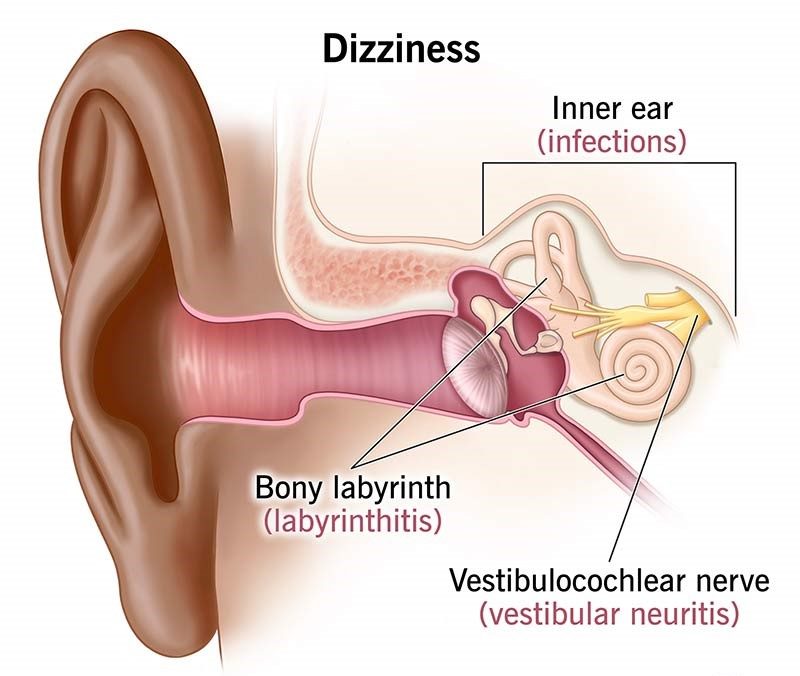Dizziness Vertigo – If you have dizziness, you may feel lightheaded and disoriented. You may feel like you are about to lose your balance. Many things can cause dizziness, such as anxiety or reactions to medications. However, dizziness may be a symptom of an underlying medical problem. If you experience frequent or severe dizziness, talk to your doctor.
Dizziness Vertigo
Dizziness Vertigo is feeling light-headed or unsteady. Many things can cause dizziness. Inner ear disorders are a common cause. Inner ear diseases include inner ear infections (top right), labyrinthitis (middle), and vestibular neuritis (far right).
Dizziness – What is Vertigo?
Healthcare providers describe dizziness as having impaired or disturbed spatial orientation. You can define dizziness as feeling light-headed or light-headed. You may feel like you need to sit down before you fall. Frequent or severe dizziness can affect your quality of life. People experience dizziness in different ways, including:
- Feeling faint.
- Nausea.
- Feeling unsteady on your feet, as if you’ve lost your sense of balance.
- Feeling disoriented or confused .
Possible Causes?

Dizziness Vertigo
Dizziness – What causes vertigo?
Dizziness Vertigo happens when something affects your sense of balance. A stable sense of balance requires a steady flow of information through your ears, eyes, tissues and central nervous system. Your central nervous system uses this information to tell your body how to maintain balance.
When something disrupts the flow, your central nervous system may process information incorrectly and you may feel unsteady and dizzy. Inner ear disorders, neurological conditions, medications, and even stress can cause dizziness.
Inner ear disorders
- Benign paroxysmal positional vertigo (BPPV). People with BPPV feel a spinning sensation when they move their head.
- Labyrinthitis. Inflammation in your labyrinth, the inner ear system responsible for hearing and balance.
- Vestibular neuritis . This disorder affects the vestibulocochlear nerve of your inner ear.
- Persistent postural perceptual dizziness (PPPD). Dizziness triggered by things or activities going on around you, such as being around crowds. PPPD symptoms come and go.
- Inner ear infections . Inflammation in your inner ear caused by viral or bacterial ear infections can block the messages your inner ear sends to your brain.
Other medical conditions
- Anemia _ Anemia is not having enough red blood cells. Dizziness is a common anemia symptom.
- Acoustic neuroma . Noncancerous tumors in your inner ear can affect your balance and cause dizziness.
- Cardiovascular problems. Problems that affect blood flow to your brain, such as irregular heartbeat (atrial fibrillation), low blood pressure (hypotension), or narrowed arteries (atherosclerosis) can cause dizziness.
- Concussion This head injury damages your brain and causes dizziness , among other symptoms .
- Neurological diseases or disorders . Migraine headaches , multiple sclerosis, and Parkinson’s disease are examples of neurological disorders that affect your sense of balance and cause you to feel dizzy.
Other common causes
Medical conditions and other problems that can cause dizziness include:
- Anxiety and stress . If you hyperventilate because you’re anxious or stressed, you may feel dizzy.
- Carbon monoxide poisoning . Breathing carbon monoxide causes dizziness.
- Dehydration . Excessive dehydration, Dizziness is a symptom of severe dehydration.
- Low blood sugar ( hypoglycemia ). Sudden dizziness is a symptom of hypoglycemia.
- Medications Blood pressure medications often cause dizziness.
- Motion sickness Motion sickness can make you dizzy and affect your balance.
Dizziness – How is vertigo treated?
Treatment for dizziness depends on the above reasons. For example, if you are dizzy because you have an inner ear infection, your healthcare provider will treat the infection. If you are taking medications that cause dizziness, your provider may recommend that you limit activities until your body adjusts to the medication. Some people benefit from a battery of vestibular tests to help determine whether dizziness Vertigo is caused by an inner ear problem and vestibular rehabilitation therapy (VRT) to help treat the dizziness. Vestibular rehabilitation treatment includes exercises to manage dizziness Vertigo symptoms.
Dizziness – Can I treat vertigo at home?
No, but you can manage dizziness . If you feel dizzy, lie down until the dizziness subsides. When you stand up, be sure to move slowly and carefully.
What are the possible complications or risks of not treating dizziness?
Dizziness may not seem like a symptom of a serious problem, but you should still talk to a doctor if you feel dizzy frequently:
- Dizziness may be a symptom of medical conditions that may worsen if left untreated.
- Dizziness is a balance problem that increases your risk of falling and possibly getting injured.
- Dizziness can make it unsafe to drive.
- Sometimes dizziness can make it difficult to work or manage your daily tasks and responsibilities.
Dizziness – Can vertigo be prevented?
The best way to prevent dizziness Vertigo is to find out why you are feeling dizzy. For example, if you feel dizzy when dehydrated, you can prevent dizziness by drinking enough water. If you are taking blood pressure medication that causes dizziness, your healthcare provider may prescribe a different medication or dose. Unfortunately, you can’t predict or prevent everything that causes dizziness, such as a neurological disorder.
When should a healthcare professional treat dizziness?
Talk to your provider if:
- Dizziness affects your ability to go about your day.
- Dizziness does not go away or keeps coming back.

Dizziness Vertigo
What is the difference between dizziness and vertigo?
With vertigo, you feel like you are moving in space or that your surroundings are spinning. Dizziness Vertigo is a general feeling of imbalance.
Everyone has bouts of dizziness – a sudden lightheadedness that comes and goes. However, some people experience severe or frequent dizziness that interrupts their daily lives. If you feel dizzy frequently, your specialist doctor Op. Dr. Evren Ay Koç Contact . This way, you’ll know why you’re feeling dizzy and what you can do to manage your dizziness.